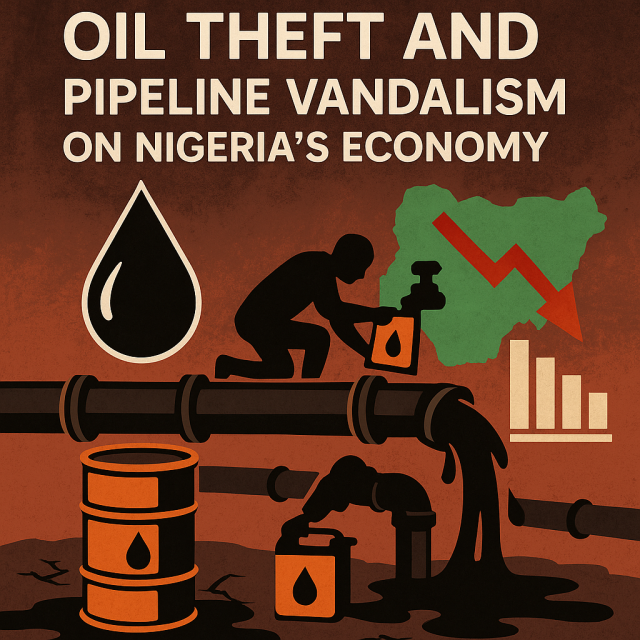
Nigeria, often dubbed the “Giant of Africa,” holds one of the largest reserves of oil and natural gas on the continent. For decades, petroleum has been the lifeblood of Nigeria’s economy, contributing significantly to government revenues, foreign exchange earnings, and national development. Yet, despite this abundant natural resource, Nigeria struggles with a paradox: it is rich in oil, but economically constrained. Among the most persistent and destructive challenges undermining the country’s economic potential are oil theft and pipeline vandalism.
These two issues have not only plagued the Nigerian oil and gas sector but have also inflicted deep wounds on the broader economy. Billions of dollars in potential revenue are lost every year, infrastructure is repeatedly destroyed, investor confidence is shaken, and local communities suffer environmental degradation and insecurity. Understanding the scope and consequences of oil theft and pipeline vandalism is critical for policymakers, industry stakeholders, and the Nigerian public.
Understanding Oil Theft and Pipeline Vandalism
Oil theft in Nigeria typically involves the illegal tapping of crude oil from pipelines and transporting it through clandestine means, often with the help of makeshift refineries or international smuggling networks. This can occur at various points in the value chain, from wellheads to pipelines to export terminals.
Pipeline vandalism, on the other hand, refers to the deliberate destruction or sabotage of oil and gas infrastructure. While some of this activity is carried out by organized criminal networks, it is also driven by local grievances in oil-producing communities, where residents feel marginalized and excluded from the wealth generated by the industry.
Together, these illegal activities have become deeply entrenched in Nigeria’s oil-rich regions, particularly the Niger Delta, and have evolved into a complex criminal enterprise involving local actors, corrupt officials, and, in some cases, powerful political interests.
The Economic Cost of Oil Theft
The financial losses from oil theft in Nigeria are staggering. According to various estimates from government agencies and independent analysts, Nigeria loses between 100,000 and 400,000 barrels of crude oil per day to theft. At an average oil price of $80 per barrel, this translates to billions of dollars in lost revenue annually.
For a country whose economy is heavily dependent on oil earnings, these losses are devastating. The government relies on oil revenue to fund essential services such as education, healthcare, infrastructure, and public sector salaries. When revenues fall short due to theft, the country is forced to borrow or cut back on critical expenditures, worsening poverty and economic instability.
Moreover, oil theft distorts the national accounting of crude oil production, making it difficult for the Nigerian government to meet its OPEC production quotas or fulfill contractual obligations to buyers. This undermines Nigeria’s credibility in the global oil market and weakens its negotiating power.
Damage to Infrastructure and Increased Operational Costs
Beyond lost revenue, pipeline vandalism causes severe damage to oil infrastructure. Each attack on a pipeline or facility leads to shutdowns, repairs, and production halts. Oil companies, both local and international, spend millions of dollars annually on security, surveillance, and repairs.
In many cases, these repeated attacks make it uneconomical for companies to continue operations in high-risk areas. This has led to the divestment of assets by major international oil companies like Shell and Chevron, who have chosen to scale down their onshore activities in favor of less risky offshore projects.
The operational cost of doing business in Nigeria’s oil sector has, therefore, risen dramatically. This not only discourages new investment but also makes existing operations less profitable, further reducing the country’s attractiveness as an oil-producing destination.
Environmental and Human Impact
One of the most tragic consequences of oil theft and vandalism is the environmental devastation it leaves in its wake. When pipelines are ruptured, they often spill large volumes of crude oil into rivers, farmland, and residential areas. Illegal refining operations, which use crude methods to process stolen oil, discharge toxic waste and black soot into the atmosphere.
The Niger Delta, once one of the most biodiverse ecosystems in West Africa, has become one of the most polluted regions in the world. Rivers are contaminated, fishing grounds are destroyed, and agricultural productivity has plummeted, robbing local communities of their traditional livelihoods.
Beyond the environment, there is also a human cost. Oil theft and pipeline sabotage often lead to deadly explosions and fires, killing hundreds of people, many of them innocent or impoverished individuals drawn into the illicit trade. The violence that accompanies this black-market economy has further destabilized the region and increased insecurity.
Loss of Investor Confidence and Macroeconomic Instability
Oil theft and vandalism have also had a chilling effect on investment. Nigeria has struggled for years to attract and retain foreign direct investment (FDI) in its energy sector. Investors are wary of the risks associated with operating in an environment where their assets can be destroyed and their profits siphoned off by criminal actors.
As a result, several key projects have been delayed or canceled. Production has stagnated, and Nigeria has often failed to meet its potential output targets, even as global oil demand fluctuates. This has broader implications for macroeconomic planning, as oil revenues form the foundation of Nigeria’s budget and foreign reserves.
In a country where inflation, currency devaluation, and unemployment are already high, the instability in oil production due to theft and vandalism worsens these conditions. The naira has come under pressure due to falling oil receipts, and budget deficits have widened, forcing the government to rely on borrowing and debt servicing.
Government and Industry Responses
Over the years, successive Nigerian governments have taken steps to curb oil theft and pipeline vandalism, but the results have been mixed. The military and security forces have launched operations to dismantle illegal refineries and arrest perpetrators. The Nigerian National Petroleum Corporation (NNPC) and private oil firms have invested in surveillance technologies, such as drones and pipeline-monitoring systems.
In 2022, the government even contracted a controversial private security company led by a former militant leader to secure oil pipelines, a move that sparked both praise and criticism. While such efforts have resulted in short-term gains, the underlying issues of poverty, unemployment, and disenfranchisement in oil-producing communities remain largely unresolved.
Many experts argue that a multi-dimensional approach is needed, one that combines security, social development, legal reform, and economic inclusion. Without addressing the root causes, enforcement alone may not yield lasting results.
Conclusion
The impact of oil theft and pipeline vandalism on Nigeria’s economy cannot be overstated. It bleeds the nation of vital revenue, damages infrastructure, scares off investors, and devastates communities. It is a national crisis that touches every part of the economy, from the federal budget to the lives of rural farmers and fishermen.
Solving this problem will require more than force. It demands honest governance, community engagement, and sustainable development in oil-producing regions. Only by creating an environment where citizens feel empowered, protected, and included in the oil wealth of the nation can Nigeria hope to overcome this deep-rooted challenge.
Until then, the country’s economic prospects will remain vulnerable, its immense natural wealth continuously drained not just by pipelines, but by policies and politics too slow to respond.
